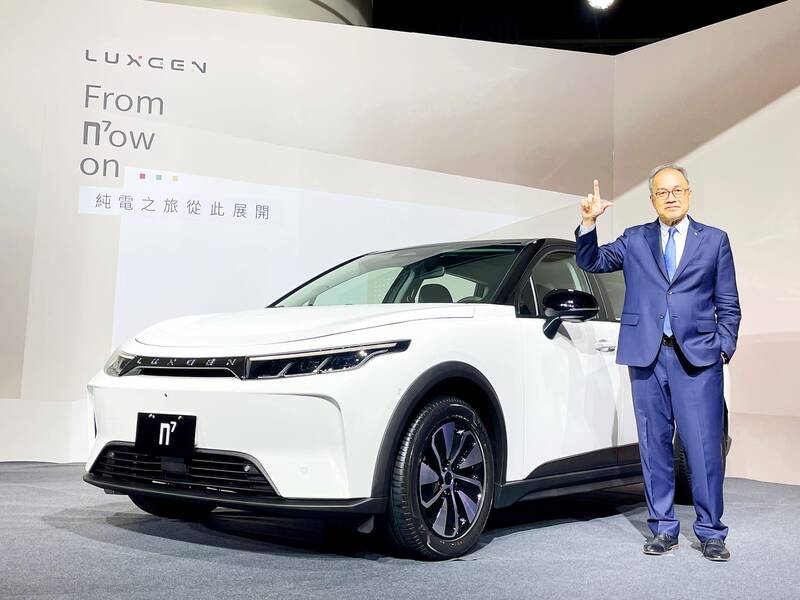Automaker Yulon Motor Co (裕隆汽車) yesterday retained its target to ship 10,000 n7 electric vehicles (EV) within the first year of launch, even though a series of typhoons led to delays in deliveries last month.
Luxgen Motor Co (納智捷汽車) an EV arm of Yulon, has fallen behind its delivery schedule, shipping only 6,091 units in the January-to-October period, Yulon said.
Luxgen seized a 20 percent share of the nation’s EV market last month, behind only Tesla Inc, it said.

Photo: Amy Yang, Taipei Times
Luxgen is quickening its delivery pace in the hope of reaching the shipment goal, Yulon spokesman Steven Lo (羅文邑) told a virtual investors’ conference yesterday.
Shipments of n7 series vehicles are to increase this month, driven by the introduction of new long-range n7 models, Lo said.
With the n7 gaining consumer interest, Yulon’s revenue rose 10 percent during the first 10 months of this year to NT$65.02 billion (US$2 billion), compared with NT$59.05 billion last year, he said.
A newly opened shopping mall in New Taipei City’s Sindian District (新店) is to generate a new revenue stream for Yulon, totaling NT$5 billion, beating an earlier estimate of NT$4.5 billion, the company said.
Next year, the mall might see revenue rise to NT$5.5 billion and help bring in a rental income of NT$470 million, the firm said.
Eslite Bookstore (誠品書店) and operators of restaurants, cafes and clothing brands are among the major tenants of the shopping mall, it said.
On the nation’s auto market, Lo said new car sales in Taiwan are expected to dip 5.58 percent to 440,000 units this year from 466,000 units last year. The forecast remained unchanged from the company’s earlier estimates, he said.
Taiwan’s new car sales in the first 10 months of the year contracted 2.8 percent year-on-year to 371,000 units, as consumers adopted a wait-and-see attitude before the launch of revamped models later this year, Lo said.
Yulon this month released last quarter’s earnings report. Net profit edged up 1.6 percent to NT$1.27 billion during the quarter, compared with NT$1.25 billion in the same period last year, it said.
During the first three quarters, net profit dipped 5.35 percent annually to NT$3.36 billion compared with NT$3.55 billion. Earnings per share dropped to NT$3.2 from NT$3.55.
Gross margin fell to 32 percent during the first nine months, from 36 percent a year earlier.

In Italy’s storied gold-making hubs, jewelers are reworking their designs to trim gold content as they race to blunt the effect of record prices and appeal to shoppers watching their budgets. Gold prices hit a record high on Thursday, surging near US$5,600 an ounce, more than double a year ago as geopolitical concerns and jitters over trade pushed investors toward the safe-haven asset. The rally is putting undue pressure on small artisans as they face mounting demands from customers, including international brands, to produce cheaper items, from signature pieces to wedding rings, according to interviews with four independent jewelers in Italy’s main

Japanese Prime Minister Sanae Takaichi has talked up the benefits of a weaker yen in a campaign speech, adopting a tone at odds with her finance ministry, which has refused to rule out any options to counter excessive foreign exchange volatility. Takaichi later softened her stance, saying she did not have a preference for the yen’s direction. “People say the weak yen is bad right now, but for export industries, it’s a major opportunity,” Takaichi said on Saturday at a rally for Liberal Democratic Party candidate Daishiro Yamagiwa in Kanagawa Prefecture ahead of a snap election on Sunday. “Whether it’s selling food or

CONCERNS: Tech companies investing in AI businesses that purchase their products have raised questions among investors that they are artificially propping up demand Nvidia Corp chief executive officer Jensen Huang (黃仁勳) on Saturday said that the company would be participating in OpenAI’s latest funding round, describing it as potentially “the largest investment we’ve ever made.” “We will invest a great deal of money,” Huang told reporters while visiting Taipei. “I believe in OpenAI. The work that they do is incredible. They’re one of the most consequential companies of our time.” Huang did not say exactly how much Nvidia might contribute, but described the investment as “huge.” “Let Sam announce how much he’s going to raise — it’s for him to decide,” Huang said, referring to OpenAI

The global server market is expected to grow 12.8 percent annually this year, with artificial intelligence (AI) servers projected to account for 16.5 percent, driven by continued investment in AI infrastructure by major cloud service providers (CSPs), market researcher TrendForce Corp (集邦科技) said yesterday. Global AI server shipments this year are expected to increase 28 percent year-on-year to more than 2.7 million units, driven by sustained demand from CSPs and government sovereign cloud projects, TrendForce analyst Frank Kung (龔明德) told the Taipei Times. Demand for GPU-based AI servers, including Nvidia Corp’s GB and Vera Rubin rack systems, is expected to remain high,